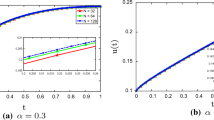Abstract
We consider a predator-prey model arising in ecology that describes a slow-fast dynamical system. The dynamics of the model is expressed by a system of nonlinear differential equations having different time scales. Designing numerical methods for solving problems exhibiting multiple time scales within a system, such as those considered in this paper, has always been a challenging task. To solve such complicated systems, we therefore use an efficient time-stepping algorithm based on fractional-step methods. To develop our algorithm, we first decouple the original system into fast and slow sub-systems, and then apply suitable sub-algorithms based on a class of θ-methods, to discretize each sub-system independently using different time-steps. Then the algorithm for the full problem is obtained by utilizing a higher-order product method by merging the sub-algorithms at each time-step. The nonlinear system resulting from the use of implicit schemes is solved by two different nonlinear solvers, namely, the Jacobian-free Newton-Krylov method and the well-known Anderson’s acceleration technique. The fractional-step θ-methods give us flexibility to use a variety of methods for each sub-system and they are able to preserve qualitative properties of the solution. We analyze these methods for stability and convergence. Several numerical results indicating the efficiency of the proposed method are presented. We also provide numerical results that confirm our theoretical investigations.
Similar content being viewed by others
References
Andrus, J.F.: Stability of a multi-rate method for numerical integration of ODE’s. Computers & Mathematics with Applications 25(2), 3–14 (1993)
Armstrong, R.A., McGehee, R.: Competitive exclusion. Am. Nat. 115(2), 151–170 (1980)
Chrispell, J.C., Ervin, V.J., Jenkins, E.W.: A fractional step 𝜃-method for convection-diffusion problems. J. Math. Anal. Appl. 333(1), 204–218 (2007)
Constantinescu, M., Sandu, A.: Extrapolated multirate methods for differential equations with multiple time scales. J. Sci. Comput. 56(1), 28–44 (2013)
Constantinescu, M., Sandu, A.: Extrapolated implicit-explicit time stepping. SIAM J. Sci. Comput. 31(6), 4452–4477 (2010)
Cortez, M.H., Ellner, S.P.: Understanding rapid evolution in predator-prey interactions using the theory of fast-slow dynamical systems. Am. Nat. 176(5), E109–E127 (2010)
Duminil, S., Sadok, H.: Reduced rank extrapolation applied to electronic structure computations. Electron. Trans. Numer. Anal. 38, 347–362 (2011)
Fang, H., Saad, Y.: Two classes of multisecant methods for nonlinear acceleration. Numerical Linear Algebra with Applications 16(3), 197–221 (2009)
Gear, C.W., Wells, D.R.: Multirate linear multistep methods. BIT Numer. Math. 24(4), 484–502 (1984)
Ginoux, J.-M., Rossetto, B., Jamet, J.-L.: Chaos in a three dimensional Volterra-Gause model of predator-prey type. International Journal of Bifurcation and Chaos 15(5), 1689–1708 (2005)
Hek, G.: Geometric singular perturbation theory in biological practice. J. Math. Biol. 60(3), 347–386 (2010)
Higham, N.J., Strabić, N.: Anderson acceleration of the alternating projections method for computing the nearest correlation matrix. Numerical Algorithms 72, 1021–1042 (2016)
Hundsdorfel, W., Savcenco, V.: Analysis of a multirate theta-method for stiff ODEs. Appl. Numer. Math. 59(3), 693–706 (2009)
Jopp, F., Breckling, B., Reuter, H.: Modelling complex ecological dynamics. Springer, Berlin (2011)
Kelley, C.: Solving nonlinear equations with Newton’s method. SIAM, Philadelphia (2003)
Kim, J., Parviz, M.: Application of a fractional-step method to incompressible Navier-Stokes equations. J. Comput. Phys. 59(2), 308–323 (1985)
Knoll, D.A., Keyes, D.E.: Jacobian-free Newton-Krylov methods: a survey of approaches and application. J. Comput. Phys. 193(2), 357–397 (2004)
Lott, P.A., Walker, H.F., Woodward, C.S., Yang, U.M.: An accelerated Picard method for nonlinear systems related to variably saturated flow. Adv. Water Resour. 38, 92–101 (2012)
Kuehn, C.: Multiple time scale dynamics. Springer, Berlin (2015)
Lenbury, Y.: Singular perturbation analysis of a model for a predator-prey system invaded by a parasite. Biosystems 39(3), 251–262 (1996)
Lue, W., Xiao, D., Yi, Y.: Relaxation oscillations in a class of predator-prey systems. J. Diff. Equat. 188(1), 306–331 (2003)
McLachlan, R.I., Quispel, G.R.W.: Splitting methods. Acta Numerica 11, 341–434 (2002)
Melis, T.M., Khatiwala, S.: Fast dynamical spin-up of ocean general circulation models using Newton-Krylov methods. Ocean Model. 21(3), 97–105 (2008)
Mergia, W.D., Patidar, K.C.: Efficient simulation of a slow-fast dynamical system using multirate finite difference schemes. Quaest. Math. 39(5), 689–714 (2016)
Obaid, H.A., Ouifki, R., Patidar, K.C.: An unconditionally stable non standard finite difference method applied to a mathematical model of HIV infection. Int. J. Appl. Math. Comput. Sci. 23(2), 357–372 (2013)
Perot, J.B.: An analysis of the fractional step method. J. Comput. Phys. 108 (1), 51–58 (1993)
Rice, J.R.: Split Runge-Kutta methods for simultaneous equations. J. Res. Natl. Bur. Stand.-B. Math. Math. Phys. 64B(3), 151–170 (1960)
Strang, G.: On the construction and comparison of difference schemes. SIAM J. Numer. Anal. 5(3), 506–517 (1968)
Vijalapura, P.K., Stain, J., Govindjee, S.: Fractional step methods for index-1 differential-algebraic equations. J. Comput. Phys. 203(1), 305–320 (2005)
Walker, H.F., Ni, P.: Anderson acceleration for fixed-point iterations. SIAM J. Numer. Anal. 49(4), 1715–1735 (2011)
Acknowledgments
Authors wish to acknowledge the anonyms referees for their valuable suggestions that have improved the presentation of the work in this paper. WDM acknowledges the African Institute for Mathematical Sciences, South Africa as well as University of the Western Cape for the financial support. KCP’s research was also supported by the South African National Research Foundation.
Author information
Authors and Affiliations
Corresponding author
Additional information
Communicated by: Silas Alben
The research contained in this chapter is also supported by the South African National Research Foundation.
Rights and permissions
About this article
Cite this article
Mergia, W.D., Patidar, K.C. Fractional-step θ-method for solving singularly perturbed problem in ecology. Adv Comput Math 44, 645–671 (2018). https://doi.org/10.1007/s10444-017-9554-8
Received:
Accepted:
Published:
Issue Date:
DOI: https://doi.org/10.1007/s10444-017-9554-8
Keywords
- Mathematical ecology
- Slow-fast dynamics
- Fractional-step θ-method
- Jacobian-free Newton-Krylov method
- Anderson’s acceleration method




